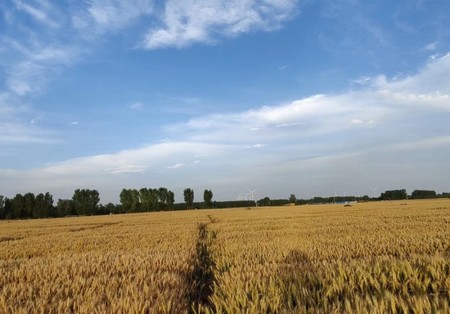Climate change will affect wheat harvest, increase economic inequality
Wheat is a key source of nutrition for people across the globe, providing 20% of calories and protein for 3.4 billion people worldwide. But rising temperatures may affect wheat harvests: the yield is likely to increase at high latitudes and decrease in low latitudes, meaning that prices for the grain are likely to change unevenly and increase in much of the Global South, enhancing existing inequalities. To assess the consequences, an international team which includes University of Groningen professor of Climate and Environmental Change Richard Bintanja has developed a new climate-wheat-economic ensemble modeling approach.

Extreme events
This improved model system allows the researchers to explicitly look at impacts of both climate mean conditions and extreme events on wheat yields, price and global supply-demand chain. ‘We know from previous research that extreme events do not necessarily respond in the same way as the mean conditions, and because these extreme events are the most impactful on societies, this is an important step forward,’ says co-author Karin van der Wiel, a climate scientist in the Royal Netherlands Meteorological Institute.
The model predicts that yield will increase in high latitude regions—countries like the United States, Russia, and much of northern Europe. In countries like Egypt, India, and Venezuela, however, wheat yields are likely to drop—in some areas by more than 15%. ‘With this change in yields, the traditional trade position of the wheat market could be deepened, and this may cause the wheat-importing regions located in low latitudes, such as Southern Asia and Northern Africa, to see more frequent and steeper wheat price spikes than wheat exporting countries,’ says Zhang.

Inequality
Not only could these changes mean that countries already facing food security issues pay even more for a pivotal food crop, but wheat prices on the global market could become more volatile and exacerbate existing inequalities. ‘Trade liberalization policy under 2° warming could stabilize or even increase farmers’ income in wheat-exporting countries but would reduce income for farmers in wheat importing countries,’ says Zhang. ‘This may create new economic inequality between farmers in wheat -exporting and -importing countries.’
Zhang and his team hope that their predictions about wheat prices and volatility will prompt global action. ‘Helping improve the grain food self-supplies in developing countries is crucial for global food security,’ says Zhang. ‘This is worthy of discussion between countries in future international agricultural collaboration policy.’
Reference: Tianyi Zhang, Karin van der Wiel, Taoyuan Wei, James Screen, Xu Yue, Bangyou Zheng, Frank Selten, Richard Bintanja, Weston Anderson, Russell Blackport, Solveig Glomsrød, Yu Liu, Xuefeng Cui and Xiaoguang Yang: Increased wheat price spikes and larger economic inequality with 2C global warming One Earth, 19 August 2022
Text: Cell Press
More news
-
10 February 2026
Why only a small number of planets are suitable for life
-
09 February 2026
Can we make the earth spin in the opposite direction?

